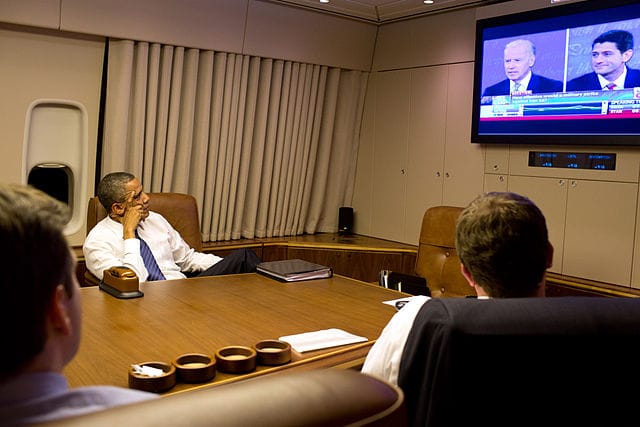Debate Moderators Perform Under Immense Pressure

Credit: White House

Going into the last few weeks of the election, just as much attention has been directed toward the performance of the debate moderators as the presidential candidates themselves.
Be it criticism of veteran moderator Jim Lehrer’s presumed passive-aggressive behavior or CNN correspondent Candy Crowley’s fierce fact-checking of President Obama’s Libya comments, the nature of the moderator has come under harsh criticism from both sides of the political aisle.
History tells us that moderators and debate formats have been as fluid as the candidates’ platform positions. The well-regarded Lincoln-Douglas debates featured no moderator, just Abraham Lincoln and Stephen Douglas duking it out in seven, three-hour long contests for the senate seat in Illinois.
It wasn't until the 20th century that America saw an actual structured presidential debate with a panel of journalists who fielded questions to the candidates while a moderator played timekeeper.
Alan Schroeder, professor of visual journalism at Northeastern University in Boston, notes that as the format and style of the presidential debates shifted from the 1960 Kennedy-Nixon debate through the 70s and 80s until PBS broadcaster Jim Lehrer became the first to moderate the debate solo in 1988. Defining the role of the moderator has gotten increasingly complex.
“There is no one-size-fits-all answer” Schroeder says. He added that the job demands someone who is very provocative and interactive, as opposed to the past when a moderator could be comfortable enough to step aside and let the candidates stand in the spotlight.
With the introduction of new formats, Schroeder has seen the significance of the moderator grow to include keeping the debate on track, shifting candidates back to the originally-stated question, and playing referee when a candidate misrepresents the facts.
However, the advent of social media in the last decade has brought along a sort of co-moderator—the American people—that diligently fact-check and dissect the debates in real-time. Particularly in this year’s debates, it is now possible to follow the reaction of voters via Twitter hashtags, Facebook posts, and likes and dislikes via YouTube live debate feeds.
According to Twitter, Tuesday’s debate garnered 7.2 million tweets, which still did not top the first presidential debate on October 4 that elicited 10 million tweets, making it the most tweeted political event ever. The vice-presidential debate pulled in a respectable 3.5 million tweets.
Between the high volume of tweets about Big Bird, Medicare, immigration, and Mitt Romney’s quip about “binders full of women,” users did not hold back on critiquing the performances of Lehrer, Crowley, or ABC news correspondent Martha Raddatz.
That rapid-fire feedback is something new. In the past, moderators for the most part could and would steer clear of any attention toward them, even though the Denver Post compiled a spirited review of past criticisms of Lehrer, including a quote from the New York Times where he was cited as saying,“Fun is not a word that leaps to mind,” when it came to moderating presidential debates.“The criticism is a little bit misdirected. They’re are doing a service for the country, not getting paid and putting their careers on hold,” Schroeder said. “But the country is so polarized politically; everybody is just on their guard.”
Yet, he believes that the best moderators know what’s at stake and understand that the political conversation cannot be about them. Former moderator Bill Wheatley agrees with Schroeder:
“…But that’s why it’s important that you have seasoned people being the moderators…It’s about the audience, really, and the moderator needs to keep the audience in mind most.”
A large part of that audience are independents or undecided voters. A Pew research poll released after the first presidential debate showed that 78 percent of independent voters thought that Mitt Romney clearly beat President Obama.
The non-partisan organization, Independent Voters of America, who cited the Pew report, tout the results as proving that not only do independent voters exist, but they take the debates seriously.
While none of the debates would shift base supporters, they can help independents make a final decision on which candidate they would cast their ballot for. At no other time would independent voters get a chance to see presidential contenders step out of their element and fight for those who may be cynical about the election process and both political parties.
With about two weeks left before the Nov. 6 election, both the Obama and Romney campaigns have one last debate to shore up the last undecided voters. Veteran CBS News anchor Bob Schieffer will moderate the debate. While he isn’t a novice of the format, having moderated the presidential debate between former President George W. Bush and Sen. John Kerry, all eyes will be glued to see if Schieffer can round out this year’s election season with a strong finish.




